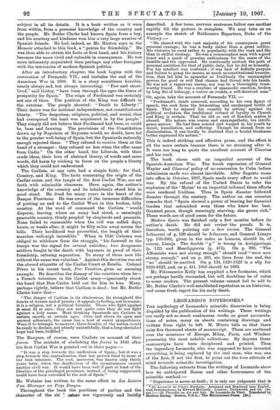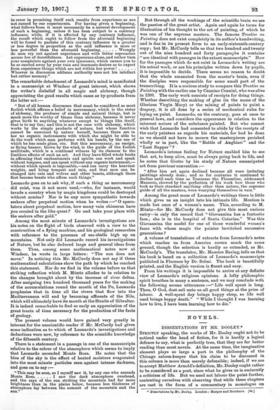LEONARDO'S NOTEBOOKS.*
THE mythology of Leonardo's scientific. discoveries is being dispelled by the publication of his writings. These Writings are really not so much continuous works as great accumula- tions of notes, many on sheets containing drawings and written from right to left. M. Miintz tells us that there exist five thousand sheets of manuscript. These are scattered over the museums of Europe, Milan, Paris, and Windsor possessing the most notable colleotions. By degrees these manuscripts have been deciphered and printed. Thus the legendary Leonardo, who was supposed to have invented everything, is being replaced by the real man, who was one of the first, if not the first, to point out the true attitude of mind towards scientific investigation.
The following extracts from the writings of Leonardo show how he anticipated Bacon and other forerunners of the scientific method:—
" Experience is never at fault; it is only our judgment that is • (1) Leonardo da Vinci', Notebook. Arranged and Rendered into English; with Introductions, by Edward McCurdy. London : Duckworth and Co. pe. net.]—(2) Thoughts on At and Life. By Leonardo da Vinci. Translated by Maurice Baring. Boston, 'ELSA.: The Merrymount Preens [$6.]
iiverror in promising itself such resells from experience as are not caused by our experiments. For having given a beginning, what follows from it must necessarily be a natural development of such a beginning, unless it has been subject to a contrary influence, while, if it is affected by any contrary influence, the result which ought to follow from the aforesaid beginning will be found to partake of this contrary influence in a greater or less degree in proportion as the said influence is more or
less powerful than the aforesaid beginning Wrongly do men ory out against experience and with bitter reproaches accuse her of deceitfulness. Let experience alone, and rather turn your complaints against your own ignorance, which causes you to be so carried away by your vain and insensate desires as to expect
from experience things which are not within her power Whoever in discussion adduces authority uses not his intellect but rather memory.",
The remarkable detachment of Leonardo's mind is manifested in a manuscript at Windsor of great interest, which shows the writer's disbelief in all magic and alchemy, though appreciating the good results which came as by-products from the latter art:- " But of all human discourses that must be considered as most foolish which affirms a belief in necromancy, which is the sister of alchemy, the producer of simple and natural things, but is much more the worthy of blame than alchemy, because it never gives birth to anything whatever except to things like itself, that is to say lies ; and this is not the case with alchemy, which works by the simple products of nature, but whose function cannot be exercised by nature herself, because there are in her no organic instruments with which she might be able to do the work which man performs with his hands, by the use of which he has made glass, etc. But this necromancy, an ensign, or flying banner, blown by the wind, is the guide of the foolish multitude, which is a continual witness by its clamour to the limitless effects of such an art. And they have filled whole books in affirming that enchantments and spirits can work and speak without tongues, and can speak without any organic instrument,— without which speech is impossible,—and can carry the heaviest weights, and bring tempest and rain, and that men can be changed into cats and wolves and other beasts, although those first become beasts who affirm such things."
Leonardo goes on to ask why, if such a thing as necromancy did exist, was it not more used,—who, for instance, would invade a country when by magic kingdoms could be destroyed without armies? Nor is he any more sympathetic towards seekers after perpetual motion when he writes:—" 0 specu- lators about perpetual motion, how many vain chimeras have you created in the like quest ? Go and take your place with the seekers after gold."
Among the most minute of Leonardo's investigations are his notes on the flight of birds observed with a view to the construction of a flying machine, and his geological researches with reference to the presence of sea-shells high up on mountains. Not only did Leonardo record his investigations of Nature, but be also deduced large and general ideas from them. Thus, among some mathematical notes now at Windsor, he wrote in large letters: "The sun does not move." In noticing this Mr. McCurdy does not say if these mathematical calculations show the path by which he reached this statement. Nor do we find in the volume before us that striking reflection which M. Miintz alludes to in relation to the changes brought about by the increase of river deltas. After assigning two hundred thousand years for the making of the accumulations round the mouth of the Po, Leonardo prophesies that in time all the rivers that flow into the Mediterranean will end by becoming affluents of the Nile, which will ultimately have its mouth at the Straits of Gibraltar. It is indeed remarkable to find so early an appreciation of the great tracts of time necessary for the production of the facts of geology.
The present volume would have gained very greatly in interest for the unscientific reader if Mr. McCurdy had given some indication as to which of Leonardo's investigations and deductions were new, by reference to the scientific knowledge of the fifteenth century.
There is a statement in a passage in one of the manuscripts relative to the colour of the atmosphere which seems to imply that Leonardo ascended Monte Rosa. He notes that the blue of the sky is the effect of heated moisture evaporated into the most minute particles seen against intense darkness, and goes on to say This may be seen, as I myself saw it, by any one who ascends Monte Rosa I saw the dark atmosphere overhead, and the rays of the sun striking the mountain had far more brightness than in the plains below, because less thickness of atmosphere lay between the summit of the mountain and the sun." But through all the workings of the scientific brain we see the passion of the great artist. Again and again he turns for illustration of his thought to the art of painting, of which he was one of the supreme masters. The famous Treatise on Painting does not exist completely in its author's handwriting, and is due in its present form to an early-sixteenth-century copy ; but Mr. McCurdy tells us that two hundred and twenty out of the nine hundred and forty paragraphs it contains " are identical with passages in the extant manuscripts." How far the passages which do not exist in Leonardo's writing are his actual work, or are his principles written down by pupils, it is impossible to decide. There seems no reason to doubt that the whole emanated from the master's brain, even if the disciples were responsible for some small part of the transcribing. It is a curious study to compare this Treatise on Painting with the earlier one by Cennino Cennini, who was alive in 1398. The early work consists of receipts for doing things. Whether describing the making of glue (in the name of the Glorious Virgin Mary) or the mixing of paints to paint a drapery, it is all done by a series of mechanical rules for laying on paint. Leonardo, on the contrary, goes at once to general laws, and considers the appearance in relation to the inherent nature of the substance painted. But who cannot wish that Leonardo had consented to abide by the receipts of the early painters as regards his materials, for had he done so we should not have to mourn the masterpieces perished wholly or in part, like the "Battle of Anghiari" and the "Last Supper"?
Leonardo's intense feeling for Nature enabled him to see that art, to keep alive, must be always going back to life, and he notes that Giotto by his study of Nature emancipated art from previons'convention
"After him art again declined because all were imitating paintings already done ; and so for centuries it continued to decline until such time as Tommaso the Florentine, nicknamed Masaccio, showed by the perfection of his work how those who took as their standard anything other than nature, the supreme guide of all the masters, were wearying themselves in vain."
Among the great mass of Leonardo's writings there is little which gives us an insight into his intimate life. Mention is made but once of a woman's name. This, according to M. Miintz—for Mr. McCurdy does not give this most curious entry—is only the record that " Giovannina has a fantastic face ; she is in the hospital of Santa Catarina." Was this Giovannina the model for one of those wonderful women's faces with whose magic the painter bewitched successive generations ?
A volume of translations of extracts from Leonardo's notes which reaches us from America covers much the same ground, though the selection is hardly so extended, as Mr. McCurdy's. The translator, Mr. Maurice Baring, tells us that his book is based on a collection of Leonardo's manuscripts published in Florence by Dr. Solmi. The book is beautifully printed, and the English version is fluent and easy.
From his writings it is impossible to arrive at any definite view of Leonardo's religious opinions. A lofty philosophic spirit breathes in many a sentence, and we may conclude with the following serene utterances Life well spent is long. Thou, 0 God, dost sell unto us all good things at the price of labour. A well-spent day brings happy sleep, so life well used brings happy death." " While I thought I was learning how to live, I have been learning how to die."







































 Previous page
Previous page